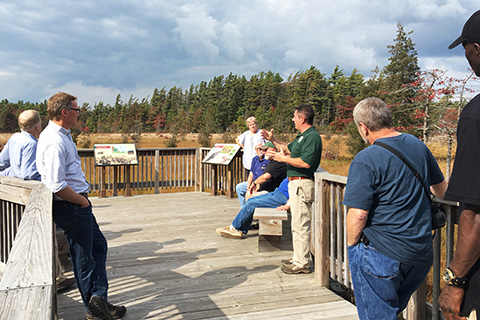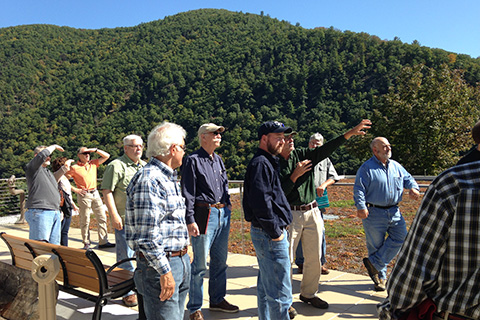When DCNR celebrates its 25th anniversary in 2020, its citizen advisory council will be sharing the celebratory cake.
The Conservation and Natural Resources Advisory Council (CNRAC) was established in 1995 with the formation of DCNR to provide a voice for the citizens in matters pertaining to the conservation and stewardship of the commonwealth’s natural resources.
For more than two decades, 18 members of the public representing various interests, backgrounds, and ideas have met at least six times a year to address issues and concerns facing the agency. Throughout the years, the council has tackled issues to help bolster DCNR’s positions, and, at times, has pushed back on a direction the agency was headed.
Council Members Reflect on Roles, Impacts of CNRAC
As a council member for the last 15 years, and now its current chair, Gary Kribbs believes the council has helped the department focus direction and areas of development by relating their goals to the public. “This diverse group helps bring sound advice and the public’s concerns to the attention of DCNR and the legislature and the governor,” Kribbs said. “They (citizens) need a group they can be completely frank and honest with. Over the years, we have had many very frank and sometimes difficult discussions in our field trip public meetings.”
Providing Stakeholder Engagement
Stakeholder engagement in DCNR’s strategic planning has been a primary role of the council over its lifetime, from holding regional meetings to gain citizen feedback on the strategic direction of the agency during the Rendell administration, to providing a forum for citizens to share their input on the state forest resource management plan in 2016. The council plans to play a coordinating role in stakeholder engagement in the upcoming development of strategic plans for the bureaus of state parks and forestry later this year and next.
Cliff David, the council’s longest serving member and a former chair, has witnessed many changes to the council and the issues it faced. But one thing he believes is constant: “CNRAC provides that sounding board for the secretary and senior staff, and it represents and acts as a conduit for the public interfacing with the department. It is there to ask questions that may not be considered by DCNR staff.”
Influencing DCNR Policy, Strategy
CNRAC’s impact on policy and strategic direction over the last two decades has been tied to some of the more controversial issues affecting the agency. For more than 10 years, council member and former chairperson Walt Peechatka has kept his eye on the use and protection of the Oil and Gas Lease Fund, a key special fund intended to restore and protect the lands DCNR manages. “While we have not achieved our goal of total restoration of the original purpose, we have gotten the attention that the issue deserves,” said Peechatka.
In 2002, DCNR found itself embroiled in a controversy stemming from the leasing of state forests lands for the drilling of natural gas in the Trenton Black River formation. While the conventional drilling was a common practice during a 50-year history on state forest lands, the proposed lease size and lack of public involvement in the decision raised the immediate attention of CNRAC. Citing concerns raised by CNRAC in a letter to John Oliver -- the DCNR secretary at the time -- the agency halted the leasing process and opened a series of public meeting across the state.
Supplying Institutional Knowledge
Having served on council for nearly two decades, Cliff David believes one of the greatest values to DCNR is the institutional knowledge that the council provides during changes in administrations. In transitions between governors, CNRAC outlines its major concerns and issues that they believe the next governor should consider as he/she appoints senior leadership and makes policy decisions.
In the transition document to the Wolf Administration in 2015, CNRAC outlined the Oil and Gas Lease Fund, resource extraction, parks and forest infrastructure, trails development, DCNR’s grant program, and biodiversity as being priority issues.
Experiencing Work in the Field

In addition to bi-monthly public meetings in the Rachel Carson Building in Harrisburg, once a year, council members make a trek into the forests and fields of Pennsylvania to learn firsthand about the work of DCNR and its partners.
A 2016 trip to the Pennsylvania Wilds region exposed CNRAC to the impact DCNR has on the economic development and prosperity of that region, from timber operations, to artisan work, to nature-based tourism. Last year’s trip centered around DCNR’s role in natural resource protection and heritage and nature tourism in the Laurel Highlands conservation landscape.
“CNRAC’s role is to bring public thoughts and ideas to light for consideration of DCNR leaders and staff,” said Rocco Ali, a 12-year council member. “Our field trips allow for this, as does the vast experience of the members of the council.”
Bringing Diverse Interests to the Table
Council members bring diverse interests and experiences to the table. Representing everything from land conservation, to community recreation, to timber interests, council members share their unique perspectives and decades of experience in their fields.
Newly appointed member Meredith Graham believes CNRAC represents a cross section of the general public and DCNR’s constituency. “Our role is to provide DCNR staff with a ‘citizen’s perspective’ on various issues.”
For council member Bob Kirchner, that perspective is motorized recreation. “The opportunity to have a seat at the table to provide a citizen perspective with regard to department policies motivated me to seek appointment," said Kirchner. "The role of the department in outdoor recreation is growing and opportunities abound for the department to make a difference in citizen experiences as well as the economies of areas impacted by department operations."
Kirchner currently leads CNRAC’s work group on motorized recreation, which will be submitting a report to the agency this year on how to improve opportunities for the motorized constituency.
Looking to the Future

As the council looks to the future, it hopes to gain more relevance with Pennsylvanians and elected officials, and to assist DCNR in addressing issues of most importance to the agency.
For Kirchner, that means council should put their efforts into helping to shape the policies that will form the basis for citizens' changing demands on our finite natural resources from a conservation, recreation, and economic perspective. “We need to be good stewards of what we have and enjoy the abundant opportunities it provides through sound management practices,” he said.
For Graham, a future top priority should be “helping DCNR to ensure that visitors to state parks and state forests have a great experience every time. This is the most ‘visible’ aspect of DCNR’s work.”
Interested in CNRAC?
CNRAC currently is seeking new members for open seats. For more information about the council, visit DCNR’s CNRAC web page.